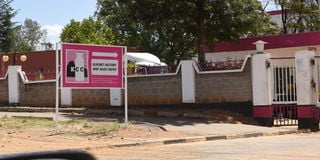Fresh controversy as farmers demand ownership of New KCC; oppose privatisation

The New KCC Eldoret depot.
What you need to know:
- The Narc government (2003-2023) acquired and placed the collapsed firm in receivership, following mismanagement
- President Mwai Kibaki's administration settled an outstanding debt of more than Sh547 million owed to the firm, with a promise to return it to the farmers once it was back on its feet
Farmers have opposed plans by the government to privatise milk processor New Kenya Co-operative Creameries (New KCC), warning that the move will hurt them.
They want the firm's ownership handed back to farmers before any talks on privatisation can occur.
In 2019, the Cabinet suspended plans to privatise the New KCC, being apprehensive about leaving the key dairy sector completely in private hands.
The government allocated the milk processor Sh400 million in 2015 to help it set up an instant powder milk plant in Eldoret. The firm has also been expanding its Nyahururu and Dandora factories.
Narc government
The Narc government (2003-2023) had acquired and placed the collapsed firm in receivership, following mismanagement.
President Mwai Kibaki's administration settled an outstanding debt of more than Sh547 million owed to the firm, with a promise to return it to the farmers once it was back on its feet.
Some farmers stated that the New KCC has helped stabilise market prices by absorbing excess milk in the market and converting it to milk powder.
"In line with the government's promise to provide a minimum guarantee price, we fear that any move to privatise would disadvantage dairy farmers in the country as we will be at the mercy of privately-owned processors," said Mr David Kipchumba, a dairy farmer from Uasin Gishu County.
'Rightful' owners
Kipkorir Menjo, the Kenya Farmers Association (KFA) director noted that the milk processor must revert to farmers, who are the rightful owners. Only they can decide whether to privatise it or not, he said.
"The government made a promise to revive the company and then hand it back to farmers, but this has not happened. Right now, we are shocked to hear about the privatisation plans," he said.
“I believe that the shares and profits that the company had made can be used to clear any debts that the government spent and hand it back to farmers," he said.
Mr Henry Otyula, a dairy farmer from Bungoma, said most farmers are in the dark over the ownership status of the firm.
"Up to now, we don’t know who truly owns the company. Many farmers who are supposed to be the key stakeholders have not been involved in the process," the farmer observed, adding that there is also a need for proper regulations to protect local farmers against market forces.
Billions allocated
The Narc and Jubilee administrations pumped billions of shillings into the company in a bid to turn around its fortunes.
The Jubilee administration allocated billions to enable the firm to modernise its equipment, and replace old machines with new ones to improve efficiency.
In 2012, Kenya witnessed a milk glut, and farmers poured their milk to express their frustration following the collapse of the dairy sector at the time. With the revival of the firm and its increased processing capacity, more milk produced locally has been absorbed.
Last year, the milk processor announced that it paid farmers over Sh5 billion in pay-out, generating income for many farmers, mainly in rural areas.
At loggerheads
The government has been at loggerheads with dairy farmers who were opposed to the planned sale of New KCC to an investor, which slowed the process of privatising the firm as the suppliers resisted the proposed allocation of shares.
In 2019, immediate former Trade and Industry Secretary Peter Munya said New KCC was a critical state investment that could not be privatised because it played an important role in controlling the price of milk in the market, thus protecting consumers against high costs.
Mr Munya said the Cabinet agreed to delay the process, which has been in the pipeline for almost a decade and instead focus on building its capacity.





